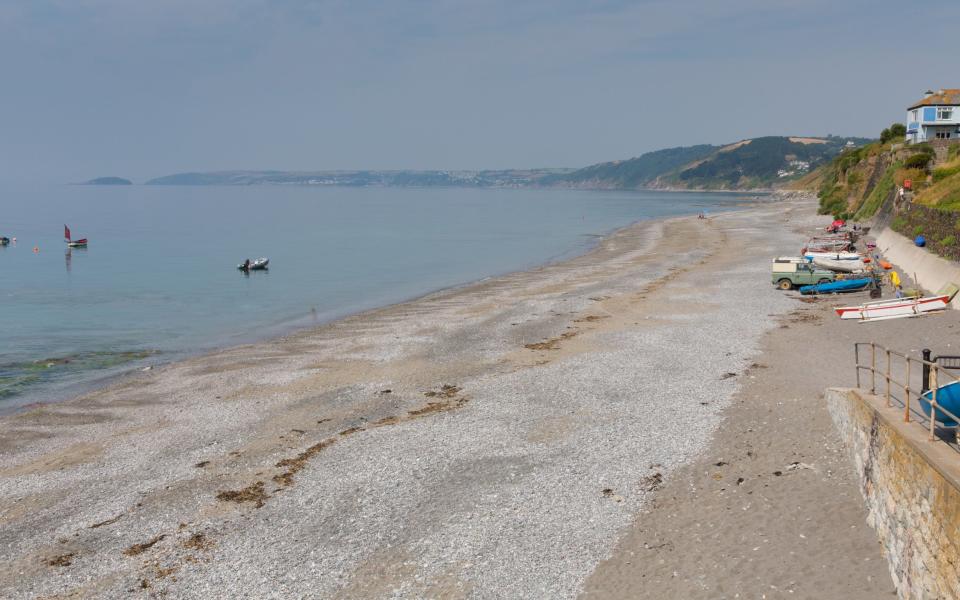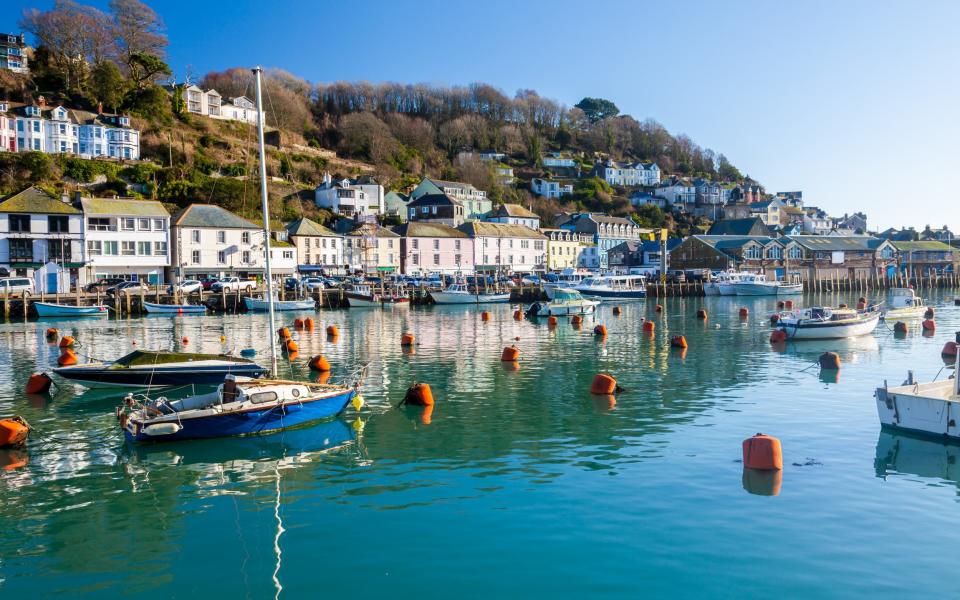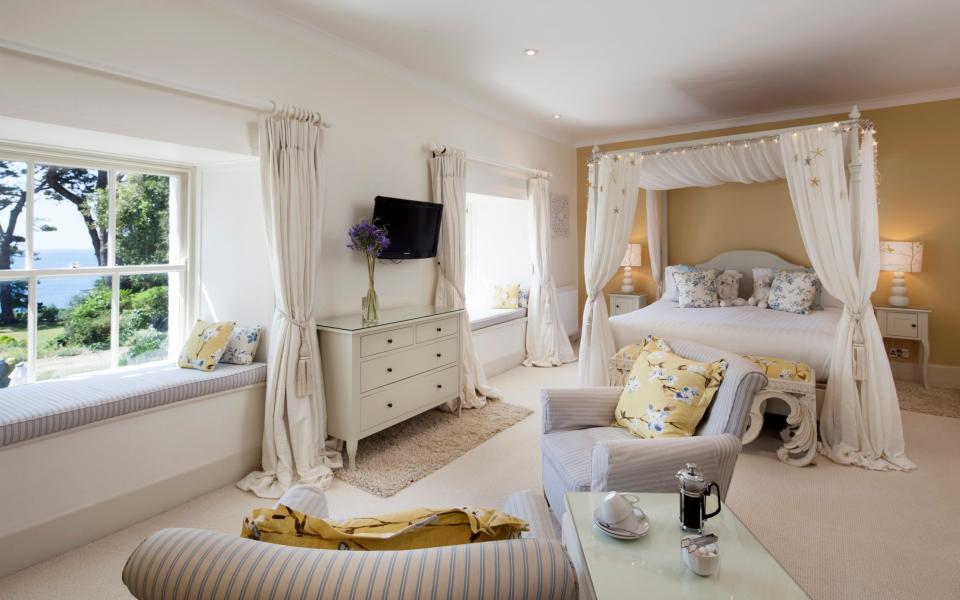‘I fell in love with a forgotten corner of Cornwall in the 1940s’

My favourite beach in the country is Downderry, in the southeast of Cornwall. I spent the early years of my childhood there, in a coastguard’s cottage overlooking the sea.
My father served in the Royal Marines and after the Second World War we lived very hand-to-mouth, as everyone did. At this time it was deeply unfashionable to visit southeast Cornwall, but that’s where we were, in this old cottage. We stayed there in the off-season, and were turfed out every summer because the owners would come down for their holidays.

It was a fabulous childhood
People were much more family-orientated in those days, because everyone was so broke. Our cousins would come down to visit for a free holiday. Not that they would find much luxury on their visit. There wasn’t an inside loo, and there was certainly no proper bathroom. I remember graduating from the butler’s sink to the smallest of the bathtubs, which was outdoors.
But it was the most fabulous childhood, because the sea was right there. We saw some fascinating climactic events from our vantage point at the cottage. I remember we saw a wind funnel coming in from the sea. I was in awe. We also once witnessed St Elmo’s fire, which was really strange. But the main draw of Downderry, for me, has always been the beach. And the reason the beach is so particularly magical at Downderry, but also why it isn’t so popular, is because of its grey sand. People don’t like it, so people don’t go there. But the grey sand is why I love it so much.
The village itself is small. It was part of the coastal defences during the war, and it had these huge pylons. I remember when I was at primary school the riggers came and dismantled them all – all the local girls went down to watch them, and we would giggle away. We also used to play in the gun pits. During the war, everyone thought the Germans were going to invade, so there were plenty of these about.
There was always a strong sense of community
We were very free, much more free than children are today. People are very protective now. We walked everywhere, a mile and a half to school on our own and didn’t think anything of it. Children don’t do that now. When my sister went off to boarding school my parents thought I’d miss her, so they got me a little dog called Dai who I took with me everywhere. We would go up to the ruins of St German’s Hut, just above Bass Rock, and scramble our way to the beach from there. It was quite treacherous, really.
But there was always somebody looking out for you, because there was a strong community. I remember on Sundays my parents would go to the pub before lunch and all the kids would be in the rockpools on the beach. We would go out at low tide to go crabbing in the seaweed, and then we would boil them up right there on the beach. We had a terrific social life, and so did our parents. They were so glad they survived the war that they became real party people. I remember in the evenings all the kids would be rounded up in one house with one babysitter, and they would all be on the beach having a big party.
It was a very different demographic, then. People are more middle class now. It sounds ridiculous to say, but I had lino in my sandals to make them last through the season. Now it has become quite posh in Downderry, there are some magnificent houses there now. But it is still very unspoilt, in many ways. People tend to rush down to the west, to the Eden Project and beyond, but there is so much to see in the southeast of Cornwall.

The deep Hessenford Valley is reminiscent of Germany (my father called it the Hessendorf Valley), and in the village itself there is a superb pub called the Copley Arms (01503 240209), which has been there for donkey’s years. Mount Edgecumbe country estate is wonderful, too. I still go to Downderry once or twice a year (I am based in Norfolk now) but I don’t tend to visit in the summer months, because I’m a gardener. And anyway, the heat doesn’t attract me in the same way the cool does.
Maybe that’s why I’ve always preferred the Atlantic to the Med. I like the wildness. When I went to Bilbao and San Sebastian I fell in love. I like that sort of ruggedness, and the rocks and the weather there are the same as ours. I suppose I loved it so much because I could have been at our coastguard's cottage, in the late 1940s, in my forgotten corner of Cornwall.
As told to Greg Dickinson
Where to stay
Stay at the Talland Bay Hotel in Porthallow. Our Cornwall expert, Rebecca Hallett, writes: “This country hotel in sleepy southeast Cornwall offers a dose of laid-back luxury. From the fresh fish served in the restaurant to the perfectly framed sea views, every aspect makes the most of its remarkable coastal location. Warm, friendly service and quirky design touches elevate it to among Cornwall’s best hotels.” (01503 272667; tallandbayhotel.co.uk).

You can also now stay at the Coastguard’s Cottage in Downderry, as described by Rosamund. The three-bed property starts from £175 per night (vrbo.com).
Getting there
Looe station connects to Liskeard (27min), which has direct trains into London Paddington (3hr 45min). Plymouth station has direct trains into London Paddington (3hr 15min), Leeds (5hr 36min) and Cardiff (3hr 45min) among other destinations.
For more places to stay in the area see our guide to the best hotels in Cornwall
Want to share your own holiday memories? Fill in the form below and in no more than 200 words, describe your favourite seaside spot in the country.
Tell us why you hold it so dear, and include detail on special pubs, hotels or lookout points along the way.


